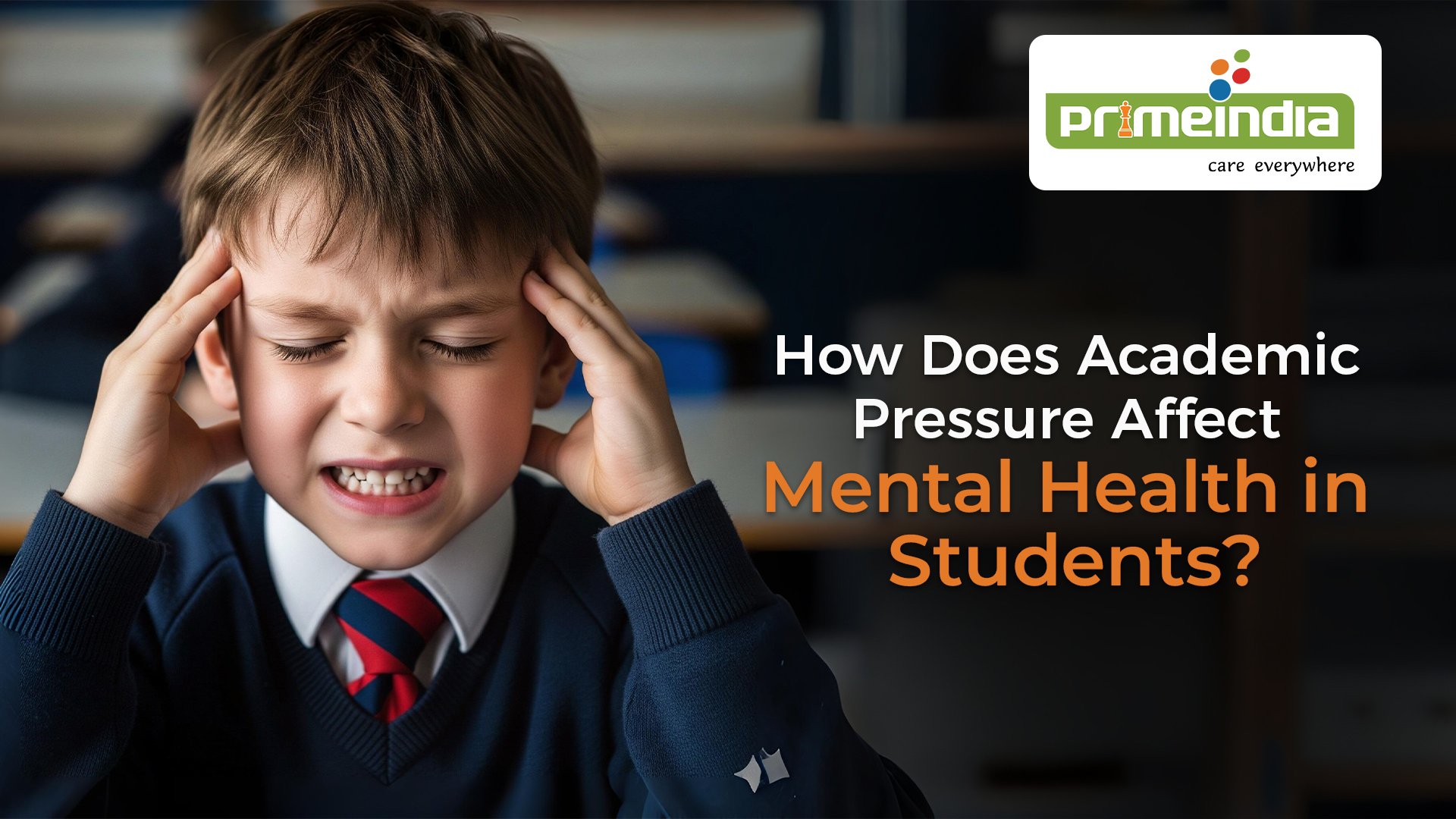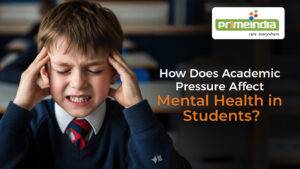Academic life often brings opportunities for growth, but it also comes with challenges that can impact a student’s overall well-being. One of the most pressing concerns today is the academic stress effects on students, which can influence not only their academic performance but also their mental, emotional, and physical health. From exam pressure to meeting high expectations, students face constant demands that may leave them feeling overwhelmed and anxious.
While some degree of stress can motivate students to perform better, excessive academic pressure can lead to burnout, lack of motivation, and even long-term health issues. Understanding how stress affects students is crucial for parents, teachers, and institutions, as it allows them to create supportive environments that promote balance, resilience, and mental well-being alongside academic achievement.
Why Does Student Mental Health Matters?
Student mental health matters because it directly impacts their overall growth, learning, and future success. When students experience poor mental health—such as stress, anxiety, or depression—it can interfere with concentration, memory, and academic performance. Beyond academics, it also affects their confidence, relationships, and ability to cope with challenges —essential life skills.
Moreover, mental health is closely tied to physical health. Chronic stress and emotional struggles can lead to sleep problems, weakened immunity, and even long-term health conditions. By prioritizing student mental health, schools, parents, and communities ensure that young people not only achieve academically but also develop resilience, self-awareness, and emotional balance—skills that support their well-being throughout life.
What Is Academic Pressure?
Academic pressure refers to the stress and tension students experience due to high expectations related to their studies. This pressure can come from various sources—parents, teachers, peers, or even the students themselves—pushing them to achieve top grades, perform well in exams, or secure future career opportunities.
While a healthy level of motivation can encourage learning, excessive academic pressure often leads to anxiety, burnout, a lack of confidence, and even a decline in performance. It may show up as sleepless nights, constant worry about failure, or feeling overwhelmed by competition and workload. In short, academic pressure is the weight students feel when their education becomes more about results and less about learning.
Signs and Symptoms of Academic Stress in Students
Academic stress often goes unnoticed until it begins to impact a student’s daily life and overall well-being. Recognizing the signs early can help in providing timely support and intervention.
1. Emotional Symptoms
- Constant worry about grades or exams
- Feeling overwhelmed or helpless
- Irritability, mood swings, or frustration
- Low motivation or lack of interest in studies
- Increased feelings of anxiety or sadness
2. Physical Symptoms
- Headaches, stomach aches, or body pains without a medical cause
- Trouble sleeping or oversleeping
- Fatigue and low energy
- Changes in appetite (overeating or loss of appetite)
- Frequent illnesses due to weakened immunity
3. Behavioral Symptoms
- Procrastination or avoiding schoolwork
- Withdrawing from friends and family
- Overdependence on caffeine or stimulants to stay awake
- Reduced participation in hobbies or extracurriculars
- Sudden changes in study habits (either over-studying or neglecting work)
4. Cognitive Symptoms
- Difficulty concentrating or remembering information
- Negative self-talk (“I’m not good enough” or “I’ll fail anyway”)
- Constant comparison with peers
- Trouble making decisions or solving problems
How Academic Pressure Affects Mental Health?
Academic pressure can motivate students to work harder, but when it becomes excessive, it can harm their emotional well-being. Constant competition, high parental expectations, and the fear of failure often take a heavy toll on students’ mental health.
- Increases Anxiety and Stress – Constant fear of failure, exams, or meeting expectations can cause chronic stress and anxiety disorders.
- Leads to Depression – Continuous pressure without proper support may trigger feelings of hopelessness, sadness, and withdrawal.
- Causes Burnout – Overstudying and lack of rest can lead to exhaustion, loss of motivation, and disinterest in learning.
- Reduces Self-Esteem – Comparing with peers or failing to meet expectations can make students feel “not good enough.”
- Impacts Sleep and Concentration – Stress disrupts sleep cycles and reduces focus, making studying even harder.
- Encourages Unhealthy Coping Mechanisms – Some students may turn to overeating, isolation, or substance use to deal with pressure.
- Weakens Emotional Resilience – Instead of building confidence, constant pressure can make students more vulnerable to setbacks.
Short-Term Effects of Academic Stress
Academic stress doesn’t just build up over time—it can also cause immediate changes in how students think, feel, and behave. These short-term effects often appear during exam seasons, assignment deadlines, or periods of intense workload.
Some common short-term effects include:
- Headaches, stomach aches, or muscle tension
- Trouble sleeping or irregular sleep patterns
- Difficulty concentrating on studies
- Irritability, mood swings, or frustration
- Loss of appetite or overeating
- Procrastination and avoiding tasks
- Increased anxiety before tests or presentations
Long-Term Effects of Academic Stress
When academic stress continues for months or years without proper management, it can leave lasting effects on students’ mental, emotional, and physical health. Unlike short-term stress, which may fade after exams or deadlines, long-term academic stress can shape overall well-being and future success.
Some common long-term effects include:
- Chronic Anxiety and Depression – Persistent stress can develop into serious mental health disorders.
- Burnout – Long-term exhaustion and loss of motivation, often leading to disengagement from studies.
- Low Self-Esteem – Constant failure to meet expectations can create lasting self-doubt.
- Sleep Disorders – Ongoing stress disrupts healthy sleep patterns, causing insomnia or fatigue.
- Weakened Physical Health – Stress can lower immunity, increase the risk of heart issues, and cause lifestyle-related illnesses.
- Unhealthy Coping Habits – Students may develop dependency on stimulants, overeating, or isolation as a way to cope.
- Academic Underperformance – Ironically, too much pressure often reduces concentration and productivity, harming results in the long run.
Role of Schools and Families in Reducing Academic Stress
Reducing academic stress requires a combined effort from both schools and families. When students feel supported at home and in their learning environment, they are more likely to perform well without being overwhelmed by pressure.
Role of Schools:
- Create a balanced curriculum that reduces unnecessary academic load.
- Promote open communication between teachers and students about challenges.
- Offer counseling and mental health support services on campus.
- Encourage extracurricular activities to balance academics with creativity and relaxation.
- Focus on learning and skill development instead of only grades and test scores.
Role of Families:
- Set realistic expectations rather than pushing for perfection.
- Provide emotional support and listen to students’ concerns without judgment.
- Celebrate efforts and progress, not just achievements.
- Encourage healthy habits like proper sleep, nutrition, and physical activity.
- Spend quality time with children to reduce feelings of isolation and stress.
Strategies to Manage Academic Pressure Effectively
Managing academic pressure is not about avoiding challenges but about learning healthy ways to cope with them. With the right strategies, students can balance performance with well-being.
- Time Management – Break tasks into smaller goals, use study planners, and avoid last-minute cramming.
- Healthy Lifestyle – Maintain proper sleep, balanced nutrition, and regular exercise to boost energy and focus.
- Relaxation Techniques – Practice mindfulness, meditation, or deep breathing to calm the mind before exams or stressful tasks.
- Open Communication – Talk to parents, teachers, or counselors about struggles instead of keeping them bottled up.
- Positive Mindset – Replace negative self-talk with encouraging thoughts; focus on effort as much as outcomes.
- Balanced Routine – Include breaks, hobbies, and social activities alongside studies to avoid burnout.
- Seek Support When Needed – Use school counseling services, peer groups, or professional help if stress becomes overwhelming.
How Prime India Helps Reduce Academic Stress on Students?
Academic stress is one of the biggest challenges faced by students today. The constant pressure to score well, manage assignments, perform in extracurricular activities, and prepare for competitive exams often leads to anxiety, fatigue, and low self-esteem. If not addressed, this stress can affect not only academic performance but also mental and physical health.
At Prime India, we understand that a child’s success is more than just grades — it’s about overall well-being. That’s why our programs are designed to reduce academic stress and help students achieve a healthy balance between learning and life.
Our Approach to Reducing Academic Stress
- Student Wellness Programs – Interactive sessions that focus on mindfulness, time management, and relaxation techniques.
- Counseling Support – Access to trained experts who guide students in coping with stress, anxiety, and exam pressure.
- Workshops & Seminars – Engaging activities on topics like positive thinking, resilience building, and emotional intelligence.
- Parent & Teacher Involvement – Helping families and educators recognize stress signals early and support students effectively.
- Holistic Health Initiatives – Nutrition, fitness, and lifestyle guidance to keep students physically strong and mentally alert.
Conclusion
In today’s competitive world, academic stress effects on students are becoming a serious concern that goes beyond just their performance in school. The constant pressure to excel, meet deadlines, and live up to expectations often affects students’ emotional balance, physical health, and overall well-being. Recognizing these challenges is the first step toward building a healthier learning environment where success is not defined solely by grades.
At the same time, both schools and families play an essential role in reducing this pressure by encouraging balance, open communication, and positive coping strategies. When students are supported and guided with compassion, they can overcome stress and focus on meaningful learning. Addressing academic stress not only protects mental health but also helps young people grow into confident, resilient individuals ready to face future challenges.


